Grebel Alumni are scattered across the globe, pursuing a vast assortment of vocations and lifestyles. With a focus on the care of our earth, the following profiles highlight a just a few of the interesting, intentional, and invaluable work some Grebel alumni are pursuing. We asked three questions: How do you work toward sustainability in your life? Why is this important to you? Do you have a memory of Grebel that relates to sustainabilty or the environment?
Val Steinmann (BSC 1991) (pictured above)
Farmer and Community Animator, Heartwood Farm & Cidery, Ospringe, ON
We moved to a small farm 17 years ago with three small children, a fledgling desire to create a more sustainable life and my intuition that developing a relationship to land would be a step in the right direction. In the intervening years, I’ve hand-milked cows, raised and butchered our own pastured chickens, cut hay, spread manure and skidded logs with a team of horses, made cheese, canned produce, hung laundry, planted hundreds of fruit and nut trees, grazed goats, sheep, pigs and cattle, run a CSA (community supported agriculture) with young farmers, and generally tried to live more simply. I’ve grappled with the realization that my efforts to reduce my eco-footprint will never feel like they are enough, and that sustaining an environment that is spiraling into decline is not going to cut it.
I’ve gradually shifted from trying to do all the right things, to being curious about the connections between healing the land, ourselves and our communities. Ecological farming offers a potent context for me to practice and experience this first hand, and I’ve discovered that the lessons of regenerating soil and restoring biodiversity offer inspiration for work in different realms. I’ve always felt drawn to sharing my story as a farmer, and offering experiences on the farm; now I’m collaborating with others to develop this content to support organizational development and build community capacity for change.
I credit my Mennonite upbringing for orienting me towards a life of service, and inspiring me to be “in the world, but not of it.” When I finally found my way to the work of relational and regenerative agriculture, I discovered that the antidote to despair for the world comes from doing the particular, small piece of the bigger work that gives me joy. On one hand, my farm work is just profoundly grounding for me, and on the other hand, I feel like it connects me in a small but significant way to the transformation of our cultural narrative and to the work of reconciliation and healing.
Grebel gave me a real appreciation for the power of the kitchen table to change the world. Eating good food together, starting with gratitude, listening and sharing conversation; the simple stuff of building relationships and cultivating community feel like a potent foundation for positive change.
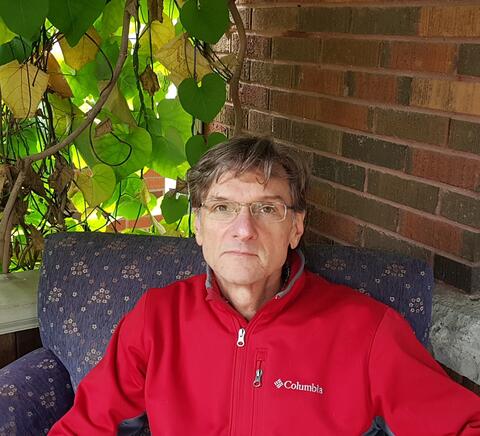
Kevin Ranney (BA 1987)
Executive Director, Sustainable Finance Solutions at Sustainalytics, Guelph, ON
Living sustainably in the context of a non-circular, fossil fuel-powered economy is challenging. I aim to make a small contribution through my work in the field of sustainable finance (which includes supporting the issuance of green bonds, among other things), and by driving an electric vehicle, avoiding food with a large ecological footprint, investing in renewable energy, avoiding waste where I can, and supporting a political party that is serious about trying to make our economy and society just and sustainable.
For many years there was a tendency to see sustainability issues as issues that kept environmentalists busy but weren’t necessarily of central importance to everyone. That perception has begun to change in recent years. The impacts of climate change are arriving sooner than expected, and we are getting a clearer picture of the damage and disruption—including social and economic disruption—that it is causing and that can be expected to increase substantially in the coming decades. Sustainability challenges are clearly a matter of huge importance to all of us. Fortunately there is growing awareness and consensus, especially around the need to address climate change. Whether or not we succeed in transforming unsustainable systems remains to be seen. On good days I am hopeful.
One of my few environment-related memories at Grebel is of occasionally accompanying my inspiring friend and roommate Greg Cressman, who made regular late-night visits to the Grebel kitchen to rinse cans for recycling, which was rare and radical in those days.
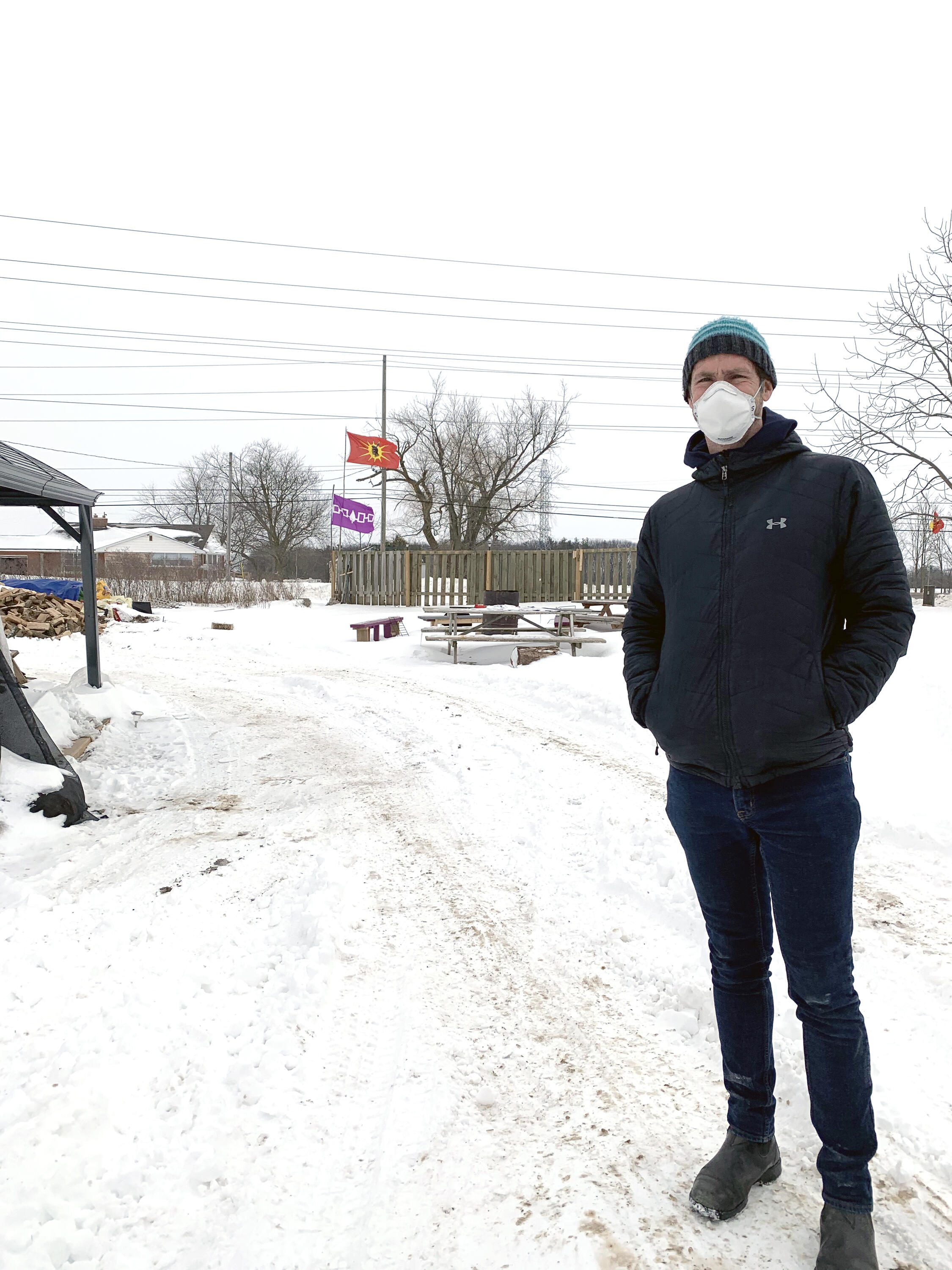
Scott Morton Ninomiya (BA 1998)
MCC Ontario’s Indigenous Neighbours program, Kitchener, ON
When I was a Grebel associate and PACS student in 1995, I participated in a 10-day PACS course offered in Labrador where we met Indigenous land defenders from Innu Nation protecting their land from colonialism and militarization. That was a big personal awakening for me about the deep connections between environmental and Indigenous justice.
Also while at Grebel, I met my wife Melody—and as our three kids have grown, my concern about the lack of significant action to address the climate crisis has grown too. For that reason, I decided to pursue a PhD in Global Governance at Balsillie School of International Affairs (UWaterloo), researching how efforts to pursue climate justice can align with and contribute to Indigenous justice on the Haldimand Tract. I have also been heavily involved in community groups like Faith Climate Justice, and the advocacy effort that resulted in all local councils committing to a 50% reduction in local greenhouse gases by 2030.
Alongside those efforts, I have also become increasingly engaged in Indigenous justice work, leading the Truth and Reconciliation Working Group of Mennonite Church Eastern Canada since 2019. In October this year, I started a new full-time job leading MCC Ontario’s Indigenous Neighbours program. I am very excited about building on MCC’s many decades of relationships and good work. As settlers, and Mennonites, our work is cut out for us. We are called to dismantle the destructive colonial systems upon which our society—and our privilege—are built. Now is the time for all of us to humbly but courageously seek the upside-down Kingdom of God on this land for the sake of all who live on it. If you would like to get involved in that work, please contact me at scottmortonninomiya@mcco.ca.

David Neufeld (1979-1981)
Organic Greenhouse Operator, Market Gardener, WWOOF/Intern and Guesthouse Host, local historian and writer, Turtle Mountain, MB
Maggie Andres (BA 1983)
Teacher/Resource Teacher/Assistant Superintendent of Student Services, Turtle Mountain, MB
We lived for 8 years in rural and then semi-urban Africa (with Mennonite Central Committee) immediately after Grebel, so our marriage was grounded in simple living routines/expectations. When we moved to rural Southwest Manitoba from Africa, we wanted to fit in with our Canadian neighbours, but in a way which was as consistent as possible with our African experience.
We live in a comfortable home (since building it over the past five years), but we used local materials as much as possible (rammed earth, earthen floor, the trees on our land) and rely on solar power, rain water collection, and the composting process to keep us going. We’ve managed to build this place on a single income, lots of labour offered by friends, great skills learned from parents and life experience, and being privileged by colonial governments.
We live on a stunningly beautiful bit of land that we care for. We encourage the treaty notion of sharing this land knowing full well that this notion goes against the capitalistic notion of ownership. We have hosted more than 100 volunteers for weeks or months, who have wanted to learn about sustainable living, develop skills for rural living, and maintain this lifestyle in their own way. We also run a straw bale guesthouse for people who want to experience something of this lifestyle. Maggie has woven many of these ideas into the classroom experience for students. We feel it’s important to aim for a lifestyle that every person in the world can reach for and that the earth can support.
I, David, fondly remember classes led by Dorothy Friesen under the Peace and Conflict and Development Studies program at Grebel that helped me orient myself as an integral being in an unjust world.
I, Maggie, recall that Peace Society discussions and activities raised these issues and they were further discussed around the dinner tables at Grebel and later in our off-campus homes with fellow associate students.
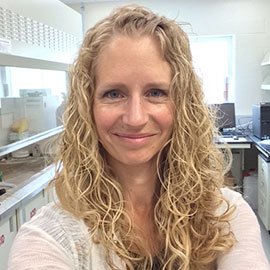
Gena Braun (BSC 2003, MSC)
Research Instrumentation Technician, Waterloo, ON
I try to consider sustainability in all of the decisions I make, both large and small. For the smaller decisions, I try to purchase food locally, limit meat consumption, and bike to work as much as possible. For the bigger decisions, we are fortunate to have an electric vehicle, we have been able to install an air source heat pump in our home, and we switched to an electric water heater and a salt-free water softener. I am also fortunate to work in a lab that supports a variety of environmental research and to co-lead a small “green-team” at our daughters’ school.
This is important to me because I see creation as a truly remarkable gift, and as something we are responsible for taking care of for future generations. From a purely practical point of view, it simply makes sense to try to preserve our own habitat! I also think it is very important to recognize that trying to live more sustainably is a journey and there will be challenges and successes along the way.
I had the pleasure of meeting many wonderful people at Grebel, including friends that challenged me to consider the long-term impacts of my choices. One roommate in particular choose to give up their vehicle because they could not reconcile the carbon footprint of their car with their desire to live sustainably. That choice still has a significant impact on how I approach my own lifestyle decisions today.

Kevin Martin (BES 2009)
Co-CEO of Power TakeOff, Waterloo, ON
The biggest impact towards sustainability in my life is through my ongoing work at Power TakeOff. Power TakeOff partners with utilities in helping their business customers of all sizes identify and achieve energy savings. We use big data analysis to target, predict, and communicate the energy saving potential of customers. Beyond the individual actions all of our employees take in our own personal lives towards sustainability, it’s incredible to see the large impact we can have together when combining our efforts and working as a team on these challenges. For example, last year we were able to help customers reduce enough energy usage so that it was equivalent to each one of our employees offsetting over 125 years’ worth of household electricity usage.
Since high school, I have felt called to be a steward of God’s creation. We have been entrusted with this miraculous gift that is our planet and all the living species and non-living resources within it. I feel compelled to be a caretaker of this gift, trying to leave it to our children in better condition than we received it, and working towards a more harmonious and sustainable relationship with our earth.
At Grebel it was so wonderful to be immersed within a group of people that were similarly interested in living out their values, seeking careers with meaning where they could impact the change they wanted to see in our world, and taking steps toward making improvements withing our communities. I recall so many inspiring speakers, alumni, and Grebel staff who had done just that—lived out their values within their lives and work, and found it incredibly motivating to be exposed to these role models.
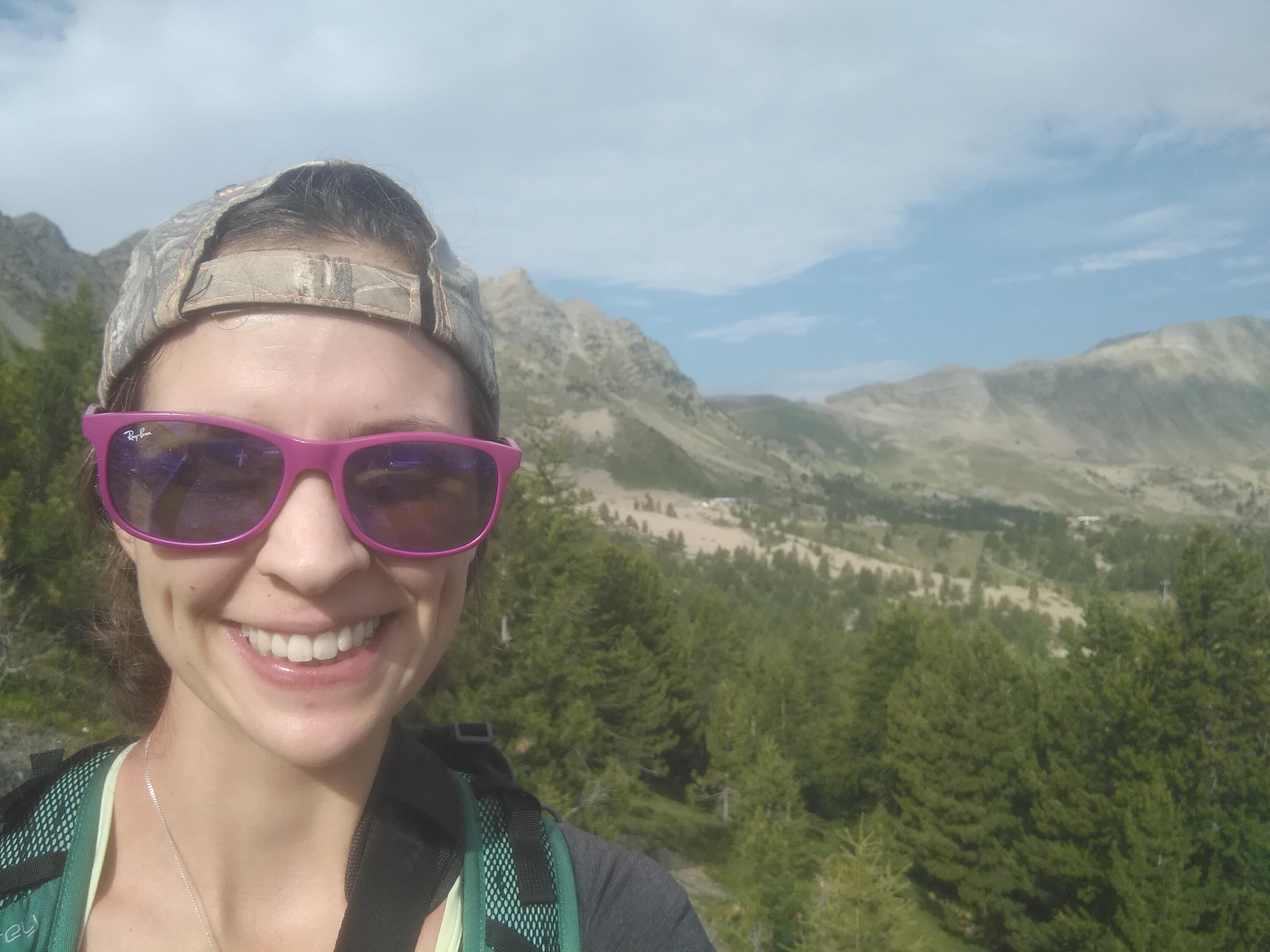
Karen Martens (BES 2017, MSC)
Ecologist-botanist, Lyon, France
Sustainability is part of my life on both a personal and professional level. At work, I search for protected and threatened species, protect wetlands, and help developers modify their projects to avoid, limit, and compensate their ecological impacts. In my personal life, I think it’s the small actions that can have a big impact: I eat local and organic as much as possible, walk to work, carpool, etc.. This year we even built our own composter in our tiny garden for our food waste!
Humanity has such a huge impact on the rest of the planet and we have the capacity to do better. It takes compassion for creatures other than us and consideration of future generations to make changes that seem difficult. There is so much life and beauty in nature and unless we act, that life and beauty will be lost. Tackling sustainability and environmental issues is a big challenge. I try to get people to realize that even small gestures can make a difference. If one person can get five people to change a habit, those five people can do the same. Our efforts become exponential and exceptional.
As a student, I loved seeing the results of the Sailor Shower Challenge. There was so much competition and some crazy short showers! I think the record was less than 20 seconds!
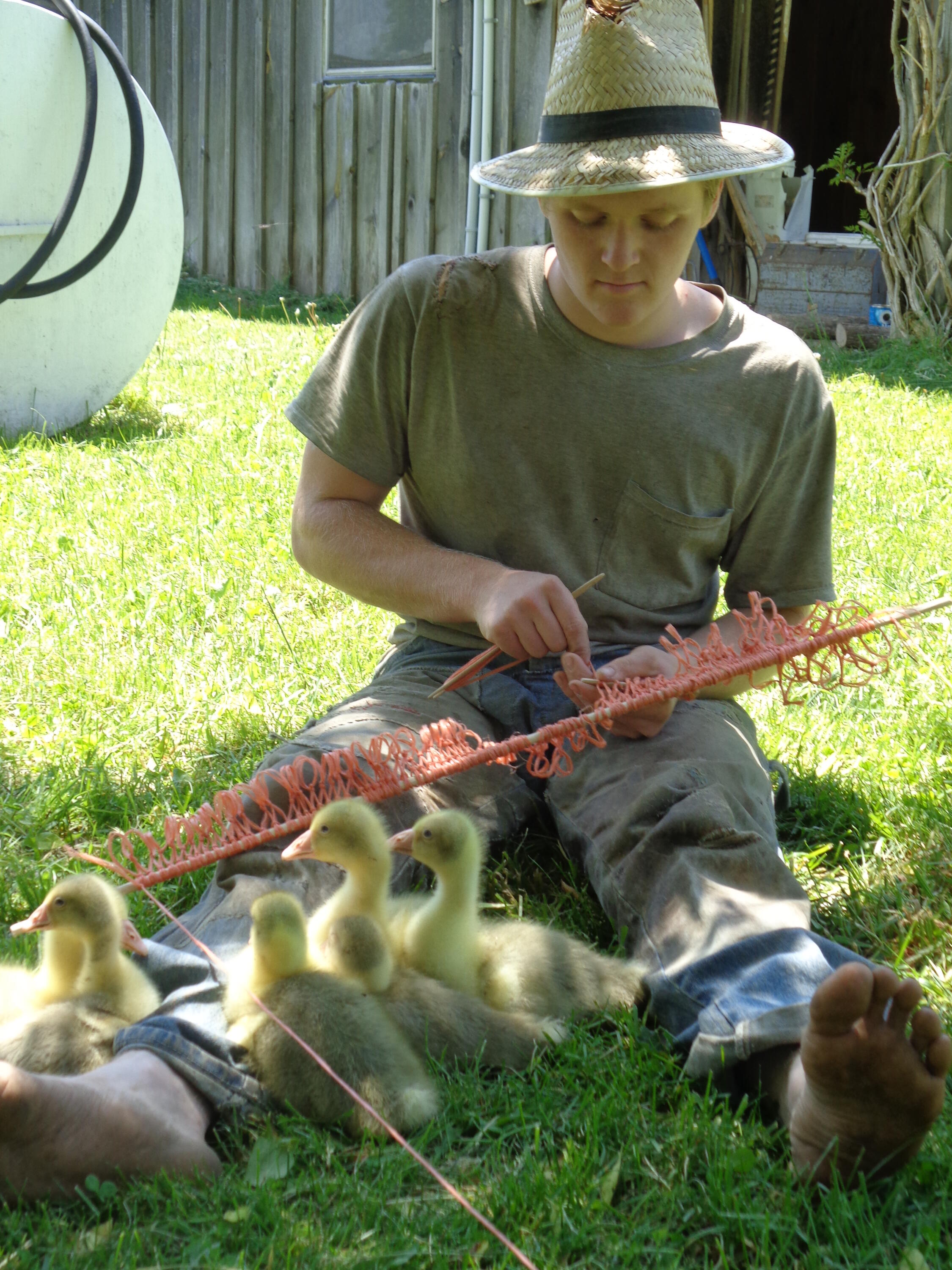
Andre Wiederkehr (BSC 2021)
Vocation: Not sure, maybe Practical Theologian,
located about 16000 pedal revolutions NW of Grebel
I’m aiming to live in a way that forms closed material cycles powered by the sun. In practice, that means that I’m working on growing, storing, and processing my family’s food supply, making the tools and infrastructure we need from local, usually biological materials, and trying to supply the energy for these and other tasks through physical labour and firewood rather than electricity and fossil fuels. This vision of sustainability requires me to choose and accept limits on what I can do. For example, I try not to eat foods that I can’t grow, and I don’t travel to places I can’t walk or bike to. My work is varied; a recent sampling includes making cheese, canning apple juice, sawing firewood with a crosscut, building a pedal-powered thresher, picking dry beans, planting fall grains, curing sheepskins, and braiding dry corn.
Several years ago, I experienced a gradual but transformative paradigm shift. I was primarily a consumer, with a narrow role in food production through my family’s farm business. I saw sustainability as something that was driven by high-level experts who developed incremental changes in each independent sector of our society’s life-maintaining framework. The more I learned, the clearer it became that our unsustainability is rapidly catching up with us “from both ends”: supply problems (like the depletion of soil nutrients, mined fuels and materials, and genetic diversity) and side-effects (like climate change, pollution, destruction of ecosystems). Experimentally, I tried to think through how one would go about constructing a holistically and genuinely sustainable way of life, and swiftly came to the conclusion that I didn’t know how, I hadn’t heard of anyone who did, and that a bunch of small, isolated actions were not going to build such a system. My faith and temperament make me love humanity (especially future generations, who deserve a chance) and the rest of creation, so I’ve become powerfully motivated to imagine and take a route that diverts us from our present rapid descent toward disaster.
A couple of times this past year, the Environment Student Society picked up trash along Laurel Creek—surprisingly fun when done together! Our best find was a partial bike discarded in the bushes. I took it back to Grebel, stripped the broken components, and passed it along to a bike mechanic friend. It eventually found its way to a former Grebel student who built it back into a functional bike. This story sticks in my mind as an example of how a cooperating community can almost effortlessly make neat things happen, in this case practicing a far healthier type of “economy.”
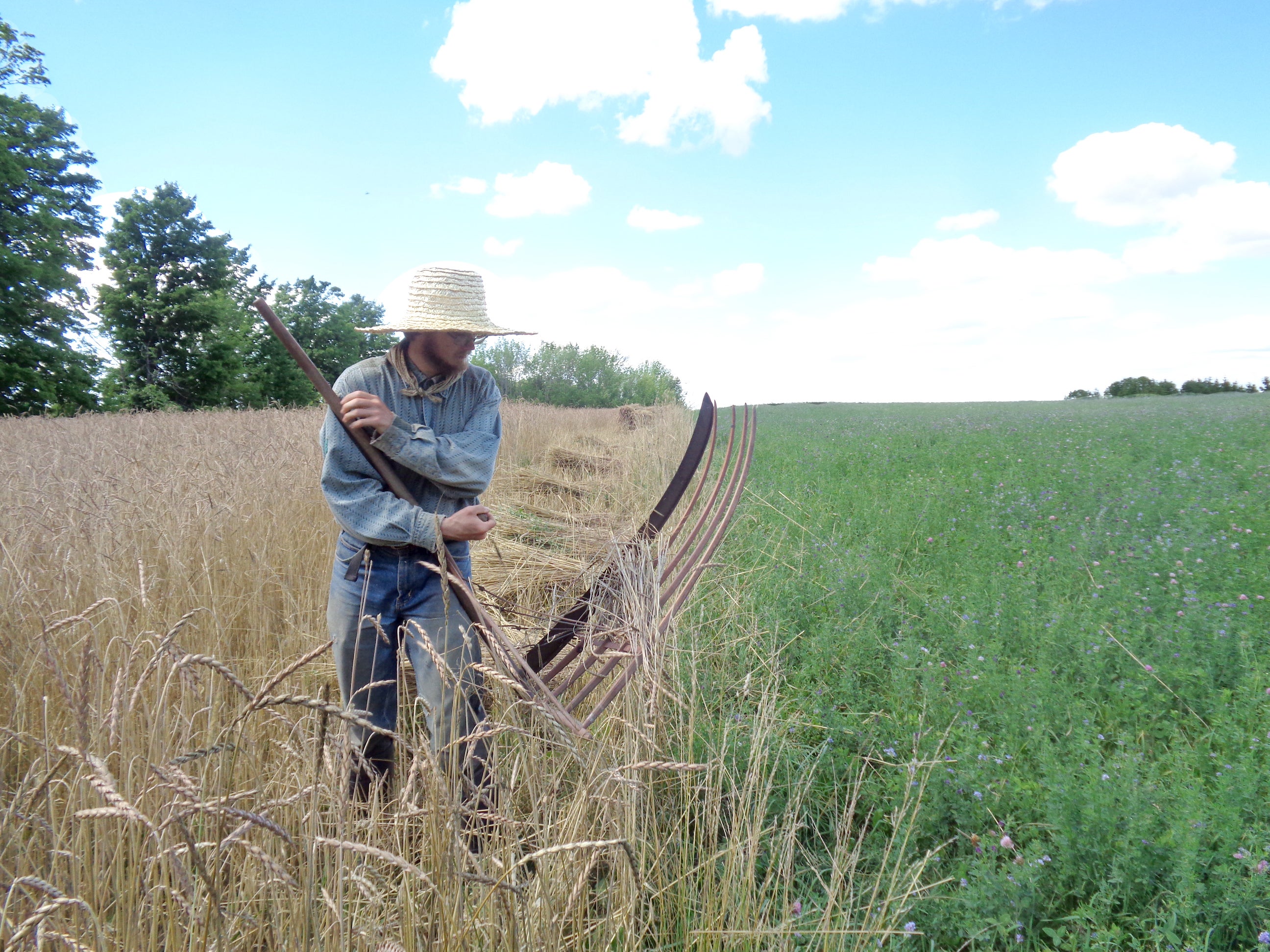
Theo Wiederkehr (BA 2020)
Subsistence farmer/gardener, Mildmay, ON, Treaty 45½ land in the traditional territory of the Saugeen Ojibway
I spend most of my time seeking better systems to meet my needs for food, fuel, clothing, and shelter using local plants and animals. Currently a focus in my work is experimenting with many kinds of crops and learning how best to grow them and save their seed so that I can grow them in future years. Examples include a wheat which will make straw appropriate for thatching and also good bread, perennial and biennial kales which can provide a source of fresh greens through the whole winter, dry beans, hazelnuts, flint corn, and various other things.
PACS showed me that much of the violence in our world revolves around colonialism and competition for natural resources. I want to do what I can to not participate in that violence, and help to heal it. I believe that setting limits on my own consumption by working directly with other species to meet my needs is a starting point.
Grebel was simultaneously very important in developing my thinking about care for creation, and disappointing in failing to demonstrate living that out. As an example, in my third year Jane Ramseyer Miller visited and led a number of students and community members in a wonderful evening of singing and speaking about the value of clean water and our responsibility to protect it from pollution. But in the reception afterwards, we were served with disposable plastic cups. As a person who spends most of my time working to connect theory to the material realities of my everyday life, I was struck by the disconnect between word and action.

Richard Cunningham (BASC 2018)
Junior Water Resources Engineer, Vancouver, BC
While the first steps to sustainability start in the home—reducing purchases, choosing sustainable methods of transportation, separating waste, etc.—we also have to consider the sustainability of our communities and infrastructure. Our future is going to be stormy, largely due to the actions of humans. In my work as a water resources engineer-in-training, I help design infrastructure that will help us weather those storms.
Considering sustainability now will make our lives much, much easier in the future. Choosing to reduce carbon emissions, planning for climate change, and preserving our environment will end up paying dividends.
During my time at Grebel, the environmental representative on the student council ensured sustainability was always on the minds of the student body. I look forward to seeing Grebel’s continued journey towards sustainability unfold.
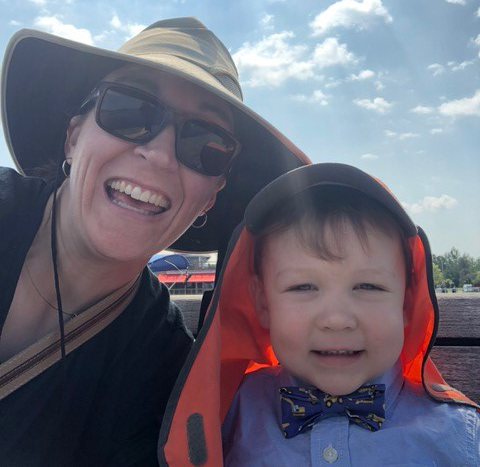
Amanda Hooykaas
(BES 2006, MPhil, MSW, PhD, FRCGS)
Human Ecologist, Adjunct Professor, Orillia, ON
As a human ecologist, I think about the interplay between people and the natural environment. I am adjunct faculty teaching environmental science, geography, and other such things at the University of Guelph and at the University of Waterloo, a registered psychotherapist, a community capacity-builder, and a parent. Every day I am tasked with making this world easier for all living beings—whether in a classroom, conducting field work, sitting across from a client, or in my own daily choices as a consumer. What I do is not about me—it’s never been about me—it’s about us. I truly believe that. And if I can use the tools and gifts I possess, then I have spent my time here well. I think that mindset is what got me into this work and that is what continues to carry me through.
My work in sustainability is important to me because I cannot imagine living in this world without it being a vital component of my being. At the beginning of every academic term I meet new students who are willing make the world better. I continue to sense the same urgency that they do, albeit softened a bit. I too am frustrated by the choices of some politicians, the marginalization of voices and experiences, and the sheer dismissal of science, of traditional ecological knowledge, and of other ways of knowing. And so I challenge both myself and those around me to stretch because I don’t think we really have other options.
I was co-environmental rep on Student Council in my first year at Grebel. Becky Elko and I worked tirelessly to do waste audits, assess the feasibility of composting (including partnering with a local pig farmer and vermi-composting), and improve the efficiency of recycling for the entire College. Every proposal was met with tremendous resistance from a variety of sources. The Grebel I read about today is far from the one we spent long nights working to improve only 20 years ago and I am pleased to see the shifts beginning to occur.
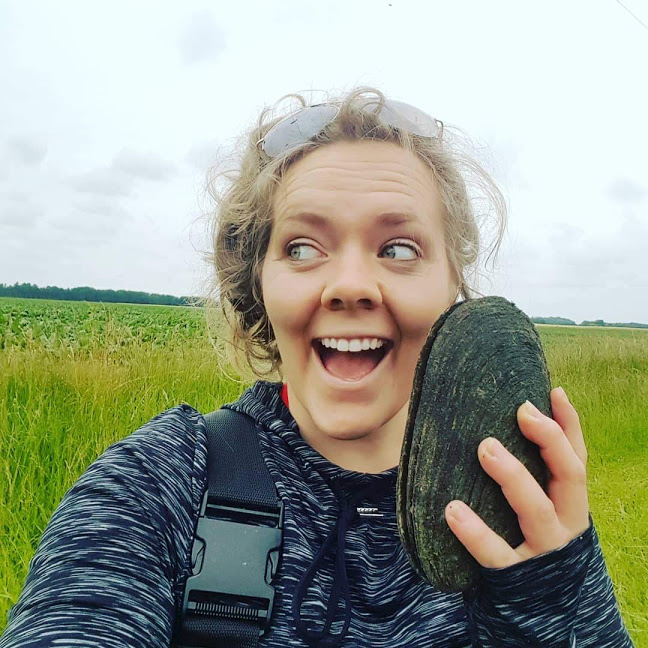
Rebecca Osborne (BSC 2018)
PhD Candidate in Environmental Toxicology, Guelph, ON
In my professional/academic life, working towards sustainability involves pursuing excellence in the science that I do. In my field of ecotoxicology, the data we generate about the environmental impacts of different sources of pollution is used by the government to set regulations. In my personal life I try to incorporate many strategies for sustainability such as walking instead of driving, eating local, minimizing waste, and repairing or recycling before throwing anything away.
Sustainability is important to me because we are just one part of highly interconnected and interdependent system. When we support and ensure the health of our environment, the rest of the system can thrive. One of the reasons sustainability is important to me is that environmental justice is often a straightforward way to disrupt systems of social injustice. For example, providing access to clean water can change social and economic outcomes by increasing time that can be spent in school rather than travelling to collect water, which improves literacy and job prospects, as well as reducing illness from water-borne diseases. Small changes in how we care for our environment can have drastic outcomes for both people and nature.
At Grebel, I was exposed to so many people who didn’t just practice sustainability in the obvious ways but lived it out fully. I learned that this embodiment of sustainability stems from seeing environmental stewardship as a part of our own mental, spiritual, and physical health. I also learned that even as you continue on your journey of sustainability it’s okay to not be able to do it all. A Community Supper speaker shared this quote: “There is only so much good that any one person can do. In order to do any good at all, there must be some good that a person is not willing to do.” To me this is one of the most important reminders—to give yourself grace and avoid burning out when it feels like your efforts aren’t going to change anything. I have found in my career so far that barriers to sustainability are rarely due to a lack of knowledge but a lack of hope, so one of the most powerful things you can do is stay hopeful and contribute what you can in the ways that work for you.
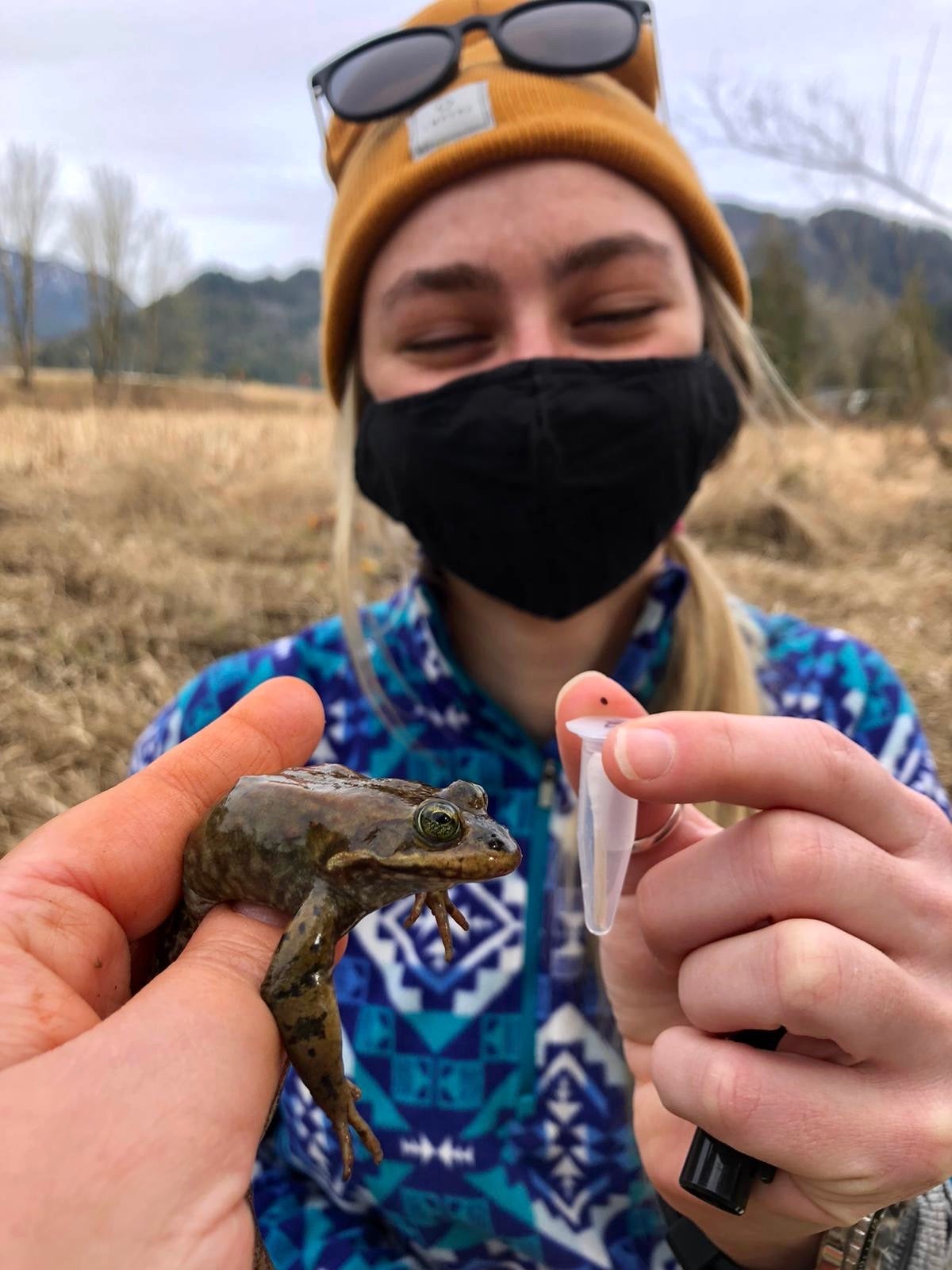
Briar Hunter (BSC 2020)
MSc Biology student at Laurentian University, Sudbury, ON
My career path falls squarely within wildlife conservation, which is an effort to stop species from going extinct as a result of humanity’s impact on the environment. I currently conduct research to prevent the extinction of Canada’s most endangered amphibian species. However, such efforts may prove pointless if we cannot convince local communities that wildlife and wild spaces are worth conserving because no matter how we try to increase population numbers, if the habitat keeps disappearing the species will not survive. Thus, a lot of my efforts also go into communicating why sustainability is important and how it impacts the wildlife around us.
I believe all wildlife has intrinsic worth and that we have a responsibility to steward and protect these valuable lives. We have particular responsibility to those species we have directly impacted and put at risk of extinction due to our unsustainable use of the environment which they require to survive. I also believe there is powerful relational value in conserving the environment. We are a part of nature; it gives us a sense of place, of well-being, and of wonder. The more we use and abuse nature, the less opportunity we and future generations will have to truly connect with and within it.
I will always remember marching and standing with many of my Grebel friends for the climate strike in 2019. I loved seeing many of my professors there too who were actively teaching me about sustainability and climate change in my courses. This was a big, significant event. I also remember all the small actions at Grebel, such as the encouragement for zero food waste, using paper plates for events, and reusing mugs instead of disposable cups. These small memories created a lasting impression of a community striving to be sustainable in every way possible.
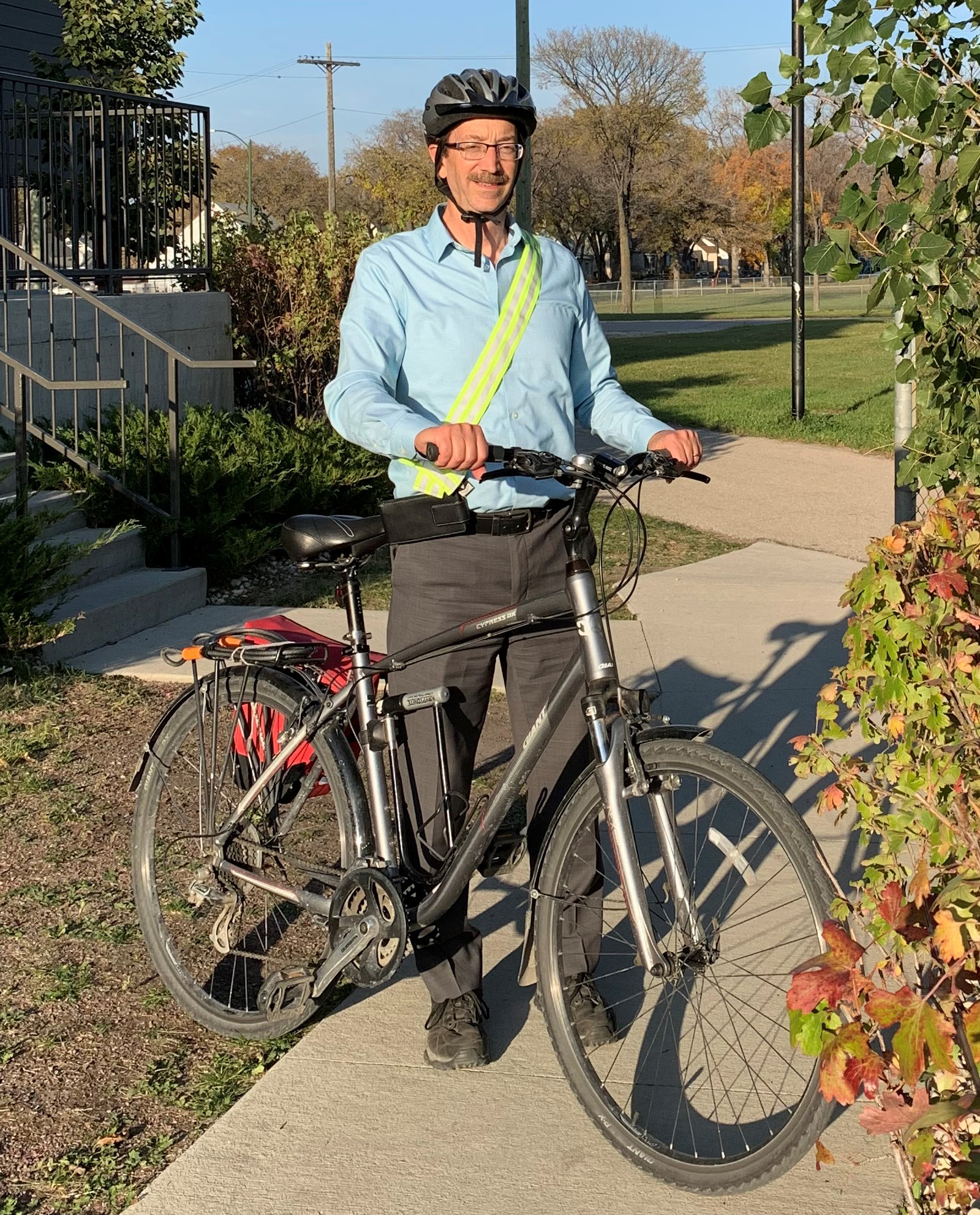
David Neufeld (BES 1983, MA, PhD)
Assistant Deputy Minister, Community Planning, Permitting and Development, Manitoba Dept. of Municipal Relations, Winnipeg, MB
I am a founding member of the Mennonite Environmental Task Force, which began in the early 1990s and grew into the Mennonite Creation Care Network (mennocreationcare.org). I have been working on water protection and land use policy for the past 36 years, first with the Government of Ontario and currently with the Government of Manitoba. Some projects include updating policies governing water taking, well construction, groundwater protection, and community and regional planning.
I first learned to love creation from my grandparents in small town Saskatchewan who grew much of their own food. My grandfather was a wood carver and taxidermist in retirement. As a teenager, my favourite pastime was looking for burrowing owls and scaring up jackrabbits in the prairies around Regina. And my desire to have a career in environmental studies brought me to the University of Waterloo.
One of my memorable courses at Grebel was Sociology and the Environment, taught by Calvin Redekop. In the course, I surveyed Old Order Mennonite attitudes toward the environment. Equipped with a map of the back-roads of Waterloo County, I met farmers on location, in their kitchens, barns, and woodlots. I learned from them the concept of Mäßigkeit, which means “it is best not to have too much or too little of anything.” I still try to apply that in my life.
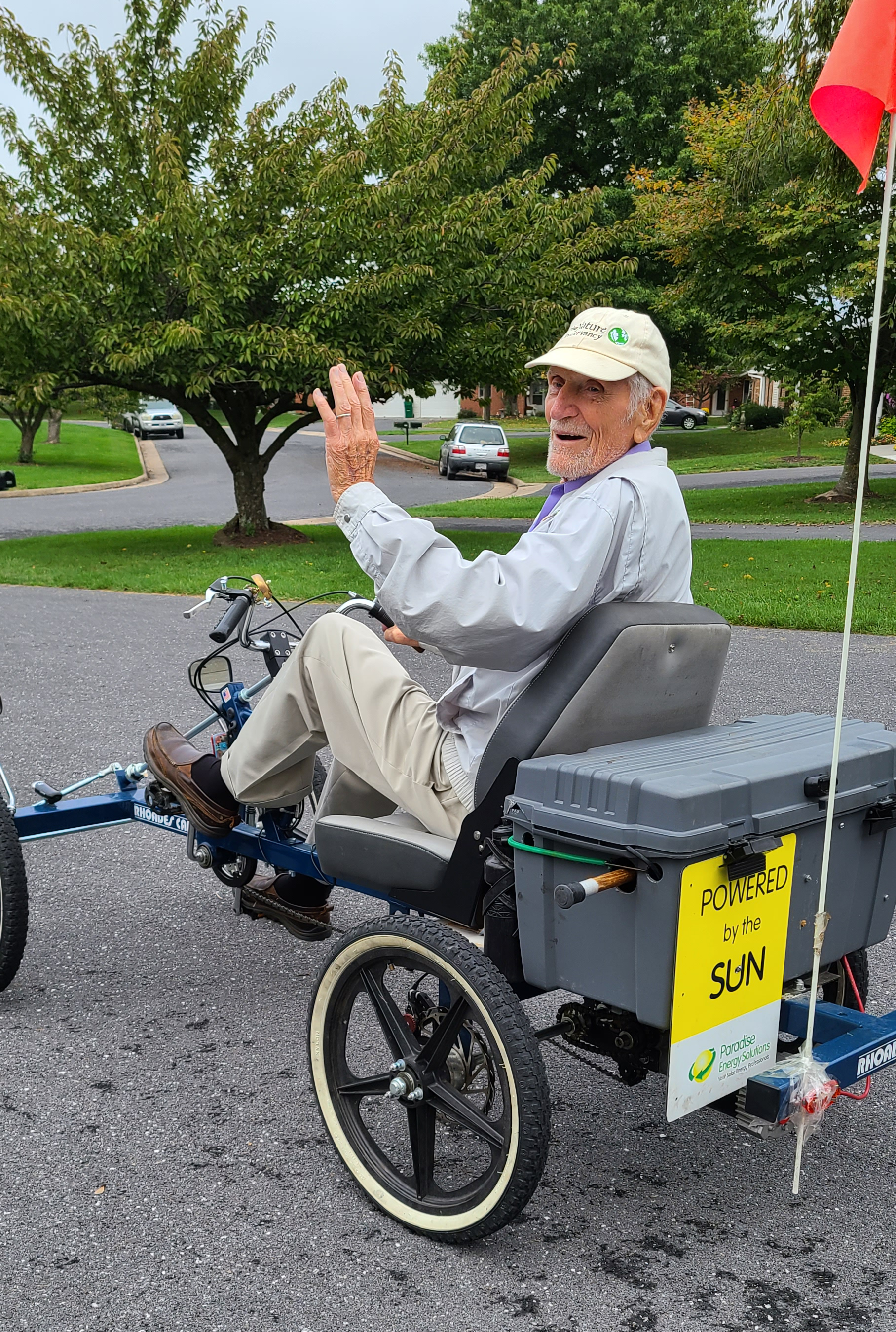
Professor Emeritus Calvin Redekop
Sociology, 1979-1990, Harrisonburg, VA
Working toward sustainability, I start with my own personal behavior. I consume as little as possible, recycle where possible, and refuse fossil energy. I drive a completely solarized-heating-cooling, electric car (Leaf) and an electric-solar quadricycle.
Sustainability is important to me because I discovered early in my childhood in Montana, our dependence on nature via the Dust Bowl and Depression, resulting in desperate congregational prayer meetings tearfully begging God to release the rain.
During the time I taught at Grebel, the relatively undeveloped Canadian landscape did not express much concern about the looming environmental crisis. I helped start a solar company in Waterloo in the early 1980s which was ahead of its time and was not successful. But I thank the many Grebel students who showed their support and interest which resulted in academic courses, research, and practical action on sustainability. Many Canada-wide developments in environmental sustainability resulted from Grebel, and the alumni described in this special issue of Grebel Now illustrate their contribution.






